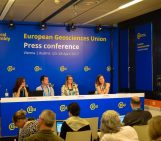
Findings supporting the urgency of climate change are coming ever-so-fast. Yet, so it seems that various economic, political, and ideological groups are stepping up their denial game. The complexity of the current state was reflected during the EGU25 press conference “Hot takes & policy quakes: When geoscience meets social science.”
The speakers, Florian Ulrich Jehn [a], Chris Smith [b], and Alice Wanner [c], take multiple angles on studying the impacts of climate change, and their work can lead policymakers to implement informed strategies for a better future. Wanner kicked off the press conference by sharing her study documenting differences among public preferences for nature-based climate solutions across six European countries [Abstract EGU25-8046], implying the need to address the climate policies on a regional level. Jenn followed by speaking about the food trade’s vulnerability in case of global catastrophes [Abstract EGU25-117], arguing that abrupt sunlight reduction would be more severe than a major infrastructure loss. Finally, Smith presented how the 1.5°C Paris Agreement goal is slipping out of reach [Abstract EGU25-11441] due to failure to act within the proposed time frame.
When following the news, Smith’s finding is disappointing, yet hardly surprising. Besides reports on rampant, tragic armed conflicts, decisions weakening climate action or cutting funding for climate monitoring are just as steady. Out of the last week’s coverage, besides others, the European Parliament voted to delay EU’s 2025 car climate target, and the US’ National Oceanic and Atmospheric Administration won’t track the cost of disasters linked to climate crisis anymore – even though they amounted over US $140 billion in damages per year over the past two decades.
In a world where the vast majority of climate policy interventions failed to bring large emission reductions, and those that worked were mostly regional and sector-specific, it was good to see Wanner’s take. Providing lawmakers with local public preferences can lead to changes that are more likely to gain broad support and avoid the possible backlash from blanket solutions. Likewise, Jenn’s warning can inform that infrastructure won’t be the silver bullet if the climate gets decimated. While underlining the complexity of the issue, seeing the dedicated teams seeking answers not only provided insights but also hope. The change begins through sharing evidence.
Speakers’ affiliation:
a. Alliance to Feed the Earth in Disasters (ALLFED), CO, USA
b. Vrije Universiteit Brussel, Department of Water and Climate, Belgium
c. University of Natural Resources and Life Sciences Vienna, Austria




